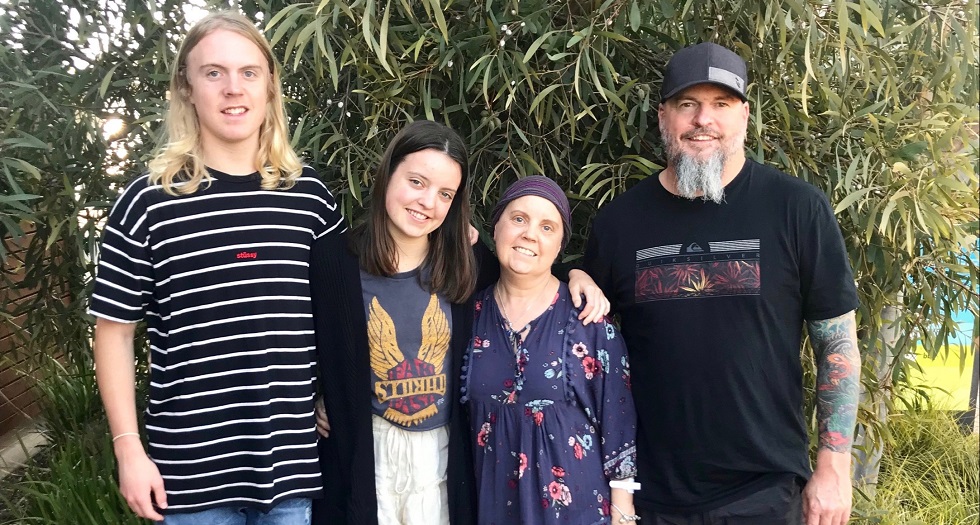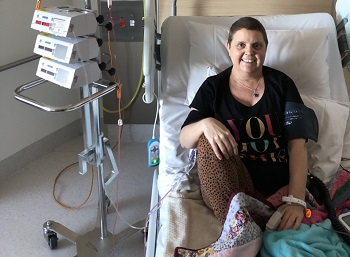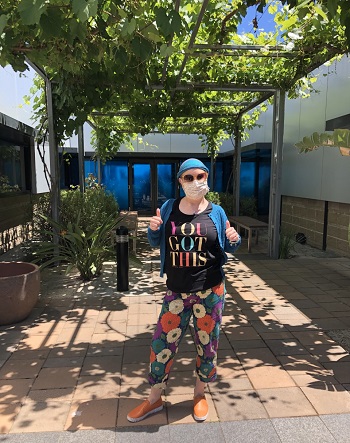Blood cancer doesn’t stop: Shelley’s story

For Shelley, life facing COVID-19 is in some ways “business as usual”, but in other ways, means changing the way she and her family go about their daily life.
After receiving a life-saving stem cell transplant in late 2019, Shelley had to navigate a ‘new normal’ way of life as she adjusted to living back in the Bridgestone Australia Leukaemia Foundation Village in Adelaide with her husband and carer, Jason. In April 2020, they finally returned home to Riverland, over 250km away, to her two children, Jett and Jayda-Star who had been under the care of Shelley’s sister.
We caught up with Shelley to learn more about how she is feeling.
Before COVID-19

We were down in Adelaide for 10 months, so a lot longer than we originally thought.
When I found out I had leukaemia, it just completely flipped our world. I was asked by my local GP in Loxton to go to the Royal Adelaide Hospital for further tests. When the registrar came to see me, he told us it was leukaemia and that I wouldn’t be going anywhere for a month. We were in complete shock.
Dealing with anxiety
I’m still immunosuppressed. I also found out post 100-days that my my cytomegalovirus (CMV) had returned. This is a common infection after a stem cell transplant presenting like a mild flu, but can be serious for someone with no immune system.
COVID-19 coming along has been intense. It brings up all my anxiety and nervousness. I’m in the four percent of vulnerable people because I’m immunosuppressed and have no vaccinations. Adding coronavirus on top of this makes me even more susceptible. This is what I’ve explained to family and friends, so they can be understanding.
Finding a trusted source of COVID-19 information
I’m making sure I get information from a reputable source, as there is that much information going around. Speak to your doctor if needs be. I look at the Leukaemia Foundation website to find my information and updates, rather than watching TV and reading newspapers, because I think the Leukaemia Foundation is a trusted source. I just thought, go to someone who you can trust, who knows what they are talking about.

Changing the way appointments are done
My doctor’s appointments have become phone consults. I do know some people who have been having nurses come out to them to prevent them from having to go anywhere.
I’ve found a quiet medical centre to have my bloods taken. I sit in the car and they call me when they are ready. But it’s still nerve-wracking putting yourself out there to a place of possible exposure.
Self-isolation
I guess for us (people with blood cancer), we are used to being in self-isolation. This is what we do, this is how we live. Everything they are trying to educate the public about is everything I have been doing since my diagnosis. Washing hands, masking up, reducing who I see, not seeing people who are unwell.
So it’s business as usual for us. Just do the right thing so we can get through this.
A pause on integrating back
During my treatment, I was getting really down. I felt like I was by myself and the world was revolving around me with everyone getting on with their lives. Meanwhile, my world had stopped.
After the stem cell transplant, I was recovering and starting to do little things. I’d started to go to the supermarket with Jason for a little shop, because for me, that was special! It was normal and I felt like I was integrating back into life. And then COVID-19 has come along and there goes my integrating. I feel like suddenly, I’ve gone back to being by myself, with the world revolving around me.
Slowing down and finding calm
In a way however, it’s nice too. I’m using time to reconnect with family and friends over facetime as the world slows down.
I’m writing in my gratitude journal, because finding a few things that you are grateful for every day can really change your mindset. I’ve also got my vision journal, where I’m putting together all my plans for my garden at home.
If I’m having a bad day, I use meditation. Or I watch a good comedy, something light and carefree!
A village of support
Staying at the Bridgestone Australia Leukaemia Foundation Village was amazing. We felt so safe and secure there. It’s a real community and from my experience there, it’s just full of love and kindness. The positivity, considering everything that is going on, is great. We need somewhere safe and calm to heal.
How to show support for Australians with blood cancer during COVID-19
I know that everyone is dealing with it in their own way and for some, humour is the best medicine. But just please be mindful of who you are sending funny COVID-19 memes and jokes to, because for some of us, it’s not a joke.
For some of us, we’re trying to avoid the constant talk of coronavirus. Talk to us about life…there are other things we can talk about.
And do the right thing. Wash your hands, cough into your elbow, stay home, self-isolate.
Doing things like that is how you can support us.
We’re vulnerable right now, both in body and in mind, so please take that into account.
And check in, have a chat, but let’s not focus on the negatives all the time.
Shelley’s story is being re-shared to mark the launch of the New Normal Same Cancer campaign on World Cancer Day, 4th February 2021.
The campaign is prompted by the nationwide declines in diagnosing and treating cancer. In Australia, we have seen a significant drop in cancer screening, pathology and surgery. Job insecurity and financial concerns, along with fear and anxiety around contracting coronavirus has resulted in many Australians deferring medical attention for new symptoms or attending routine follow-up appointments.
Cancer cases do not disappear as a result of reduced screening, they just remain undetected. And when cancer is diagnosed at a later stage, it is more difficult to treat and survival rates decline. Together, we want to ensure that no patient is left behind. Find out more at newnormalsamecancer.com.au
Last updated on May 24th, 2024
Developed by the Leukaemia Foundation in consultation with people living with a blood cancer, Leukaemia Foundation support staff, haematology nursing staff and/or Australian clinical haematologists. This content is provided for information purposes only and we urge you to always seek advice from a registered health care professional for diagnosis, treatment and answers to your medical questions, including the suitability of a particular therapy, service, product or treatment in your circumstances. The Leukaemia Foundation shall not bear any liability for any person relying on the materials contained on this website.